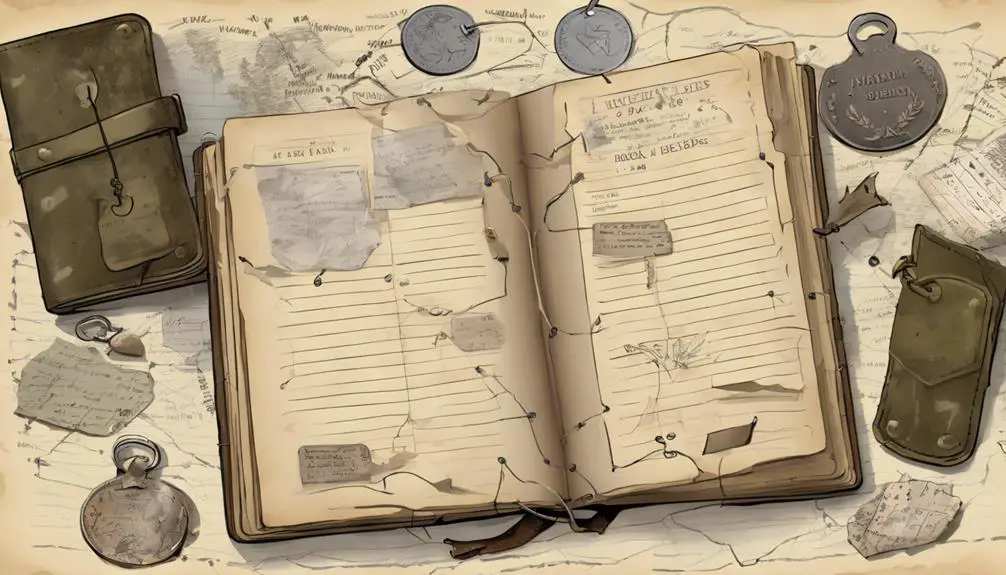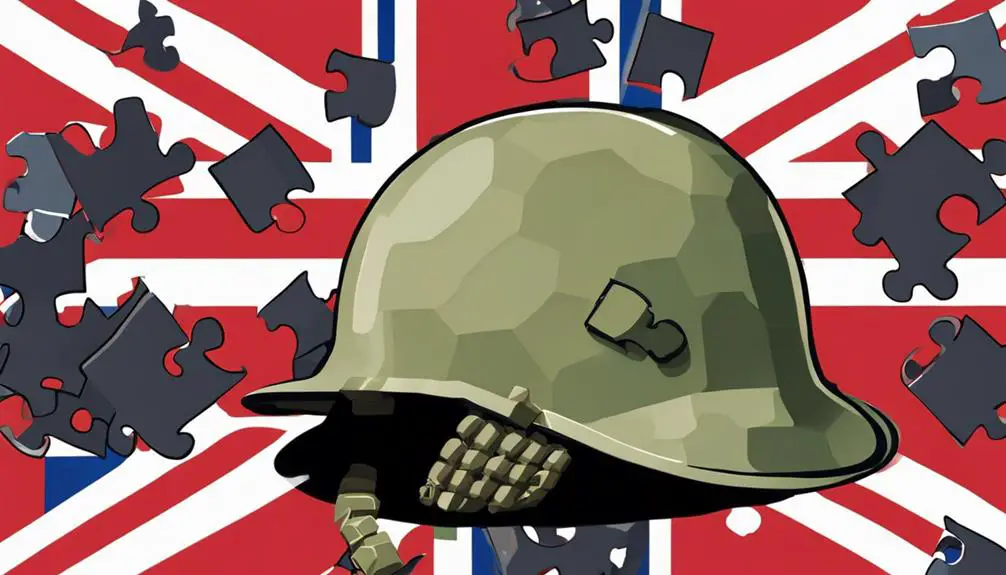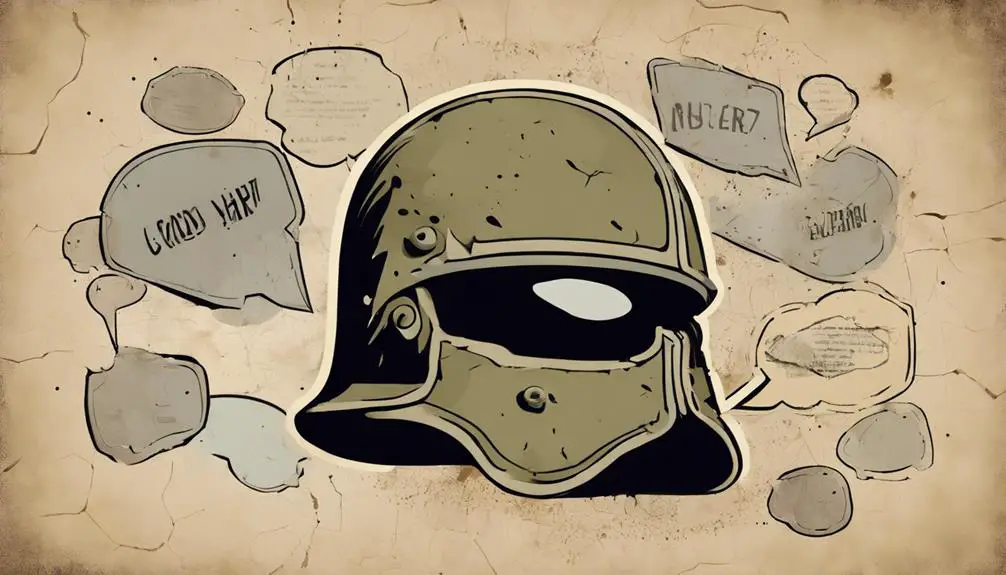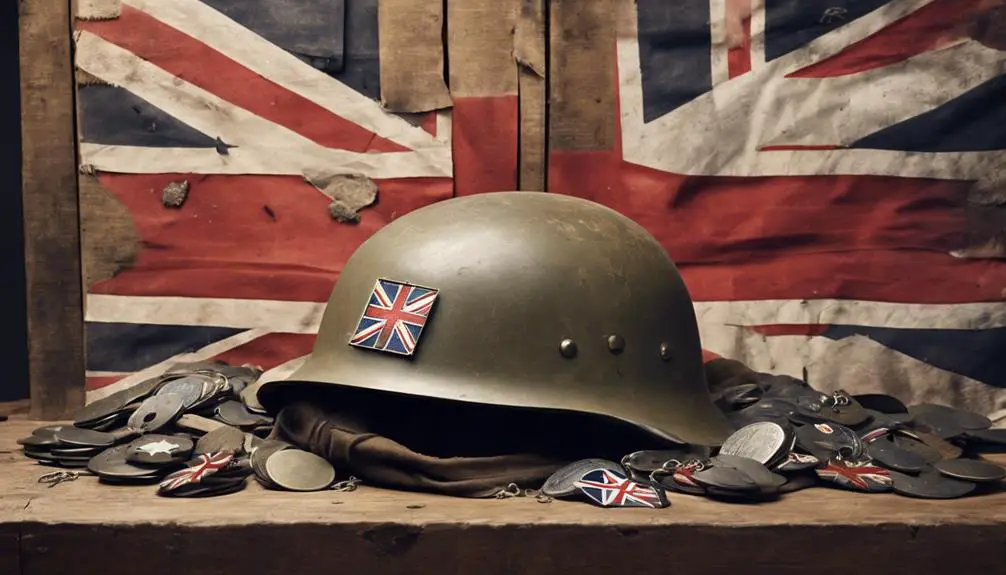You're about to reveal the secrets of British military slang acronyms, born from the trenches of World War I and II, where concise communication meant the difference between life and death. You'll discover acronyms like 'Oscar Mike' and 'Sitrep', essential for swift and accurate communication in high-pressure situations. From 'ROE' for Rules of Engagement to 'CAS' for Close Air Support, these acronyms are integral to military culture. As you explore further, you'll decipher the code to seamless communication, and unveil the nuances of British military slang acronyms, each with its unique history, purpose, and cultural significance waiting to be uncovered.
Origins of Military Lingo

When you explore the world of British military slang, it's important to understand that the origins of this lingo can be traced back to the early 20th century, when the British military began adopting abbreviations and acronyms as a means of efficient communication.
This historical roots of military slang are deeply rooted in the need for concise communication during World War I and II. As the military expanded, the language adaptation became vital to guarantee swift and accurate transmission of information.
The British military's adoption of abbreviations and acronyms was a response to the complexities of modern warfare. With the increasing use of technology, the need for rapid communication became essential. By shortening words and phrases, military personnel could quickly convey complex information, reducing the risk of miscommunication.
This language adaptation not only improved communication but also became an integral part of military culture. As you explore further into the world of British military slang, you'll discover how these abbreviations and acronyms have become a fundamental component of military language, facilitating efficient communication in high-pressure situations.
Common Acronyms in Action
In the heat of battle, you're likely to hear phrases like 'Oscar Mike' or 'Sitrep,' which are just a couple of examples of the many acronyms that have become an integral part of British military communication. These acronyms are used to convey complex information quickly and efficiently, often in high-pressure situations.
During Slang Deployment, these acronyms are used to facilitate Code Conversations between team members, ensuring seamless coordination and execution of missions.
You might hear 'Oscar Mike' (On the Move) to signal that a unit is relocating, or 'Sitrep' (Situation Report) to request an update on the battlefield situation. Other common acronyms include 'ROE' (Rules of Engagement) to clarify protocols for engaging enemy forces, and 'CAS' (Close Air Support) to request air support.
These acronyms are deeply ingrained in British military culture, allowing personnel to communicate swiftly and accurately, even in the most intense situations. By using these acronyms, soldiers can focus on the task at hand, knowing that their messages are being conveyed efficiently and effectively.
Decoding Slang for Newbies

You'll need to decipher the code of British military slang to stay in the loop, especially if you're new to the ranks. As a newbie, overcoming slang barriers can be challenging, but with a little practice, you'll be speaking like a pro in no time.
Here are some essential slang terms to get you started:
| Slang | Meaning |
|---|---|
| Squaddie | Soldier |
| Ruperts | Officers |
| Gobsmacked | Shocked or surprised |
| Brew | Cup of tea |
| Scran | Food |
Mastering these basic terms will help you navigate everyday conversations with ease. Remember, understanding British military slang is key to seamless newbie navigation. So, take the time to learn these essential terms and you'll be well on your way to becoming a seasoned pro. Don't let slang barriers hold you back – crack the code and stay in the loop!
Acronyms in Different Branches
Across the British military's various branches, a unique set of acronyms has developed to serve specific purposes, and understanding these branch-specific abbreviations is essential to effective communication.
As you explore the world of British military slang, you'll notice that each branch has its own distinct set of acronyms tailored to their unique operations and culture.
In the Royal Marines, for instance, you'll encounter acronyms like 'RM' for Royal Marines, 'CDO' for Commando, and 'SBS' for Special Boat Service. These abbreviations are deeply ingrained in the Marines' culture and are used extensively in their daily operations.
In the Army, Corps-level acronyms like 'HQ' for Headquarters and 'G1' for General Staff Branch are commonly used. The Army Corps also employs acronyms specific to their various regiments, such as 'RTR' for Royal Tank Regiment and ' PARA' for Parachute Regiment.
Evolution of Military Jargon

As you've become familiar with the branch-specific acronyms, you're now ready to explore how military jargon has evolved over time, influenced by historical events, technological advancements, and cultural shifts.
The evolution of military jargon is a reflection of the adaptability of the armed forces, as they've navigated the complexities of warfare and cultural adaptation.
Historical significance lies in the way military slang has been shaped by major conflicts, such as World War I and II, and more recent operations in the Middle East.
The introduction of new technologies has also played a significant role in shaping military jargon, with abbreviations and acronyms emerging to describe new equipment, tactics, and procedures.
Moreover, cultural shifts have led to changes in the way military personnel communicate, with modern military jargon reflecting the diversity of the modern armed forces.
As you explore deeper into the evolution of military jargon, you'll uncover a rich tapestry of linguistic innovation, driven by the need for efficient communication in high-pressure environments.
Slang in Modern Warfare
In modern warfare, the proliferation of advanced technologies, such as drones and cyber warfare capabilities, has spawned a new wave of slang that reflects the evolving nature of combat operations. As you're aware, the language of war is constantly adapting to new threats and technologies.
You'll notice that terms like 'cyber warrior' and 'virtual battleground' have become commonplace, reflecting the shift towards digital combat. In this virtual arena, soldiers must navigate the complexities of Cyber Warfare, where hackers and cyber attacks pose a significant threat to national security.
You'll find that military personnel are now using slang to describe these new forms of combat, such as 'digifog' (digital fog, referring to the uncertainty of online operations) and 'cyops' (cyber operations). These terms not only facilitate communication but also reveal the evolving nature of modern warfare.
As you delve deeper into the world of military slang, you'll discover how these terms are shaping the way soldiers think, communicate, and operate in the digital age.
Frequently Asked Questions
Are Military Slang Acronyms Used Only in the British Military?
You might assume that military slang acronyms are unique to the British military, but that's not entirely true. While they do have a rich historical origins in the UK, other countries have their own versions too.
The cultural significance of these acronyms lies in their ability to create a sense of camaraderie among soldiers. However, it's essential to recognize that military slang acronyms aren't exclusive to the British military, and their usage is more widespread than you think.
Can Civilians Use Military Slang Acronyms in Informal Conversations?
You're wondering if you can casually drop military slang acronyms into everyday conversations.
While it's tempting to borrow from military culture, consider the potential for cultural appropriation.
Using terms without understanding their origins or respecting their significance can come across as insensitive.
Be mindful of social norms and the audience you're communicating with.
If you're not part of the military community, it's best to avoid using acronyms that might be seen as borrowed or pretentious.
Are All Military Slang Acronyms Officially Recognized by the Government?
It's crucial to understand that all acronyms are officially recognized by the government, but that's not always the case.
In reality, government regulation of acronyms is often limited to official standards in specific industries.
While some acronyms may be widely adopted, they mightn't meet the government's standards for official recognition.
It's important to realize that government recognition isn't always a guarantee, even for widely used acronyms.
Do Military Slang Acronyms Vary Greatly Between Countries?
As you explore the world of military slang acronyms, you'll notice that they vary greatly between countries due to cross-cultural differences. International variations in language, history, and military structures contribute to these differences.
You'll find that acronyms are often tailored to a country's specific military needs, making them unique to that nation's culture and context.
Are Military Slang Acronyms Only Used for Communication Purposes?
You might think that military slang acronyms are only used for communication purposes, but that's not entirely true. While they do facilitate quick and efficient exchange of information, their role goes beyond that.
These coded language abbreviations serve as a secure transmission method, ensuring sensitive information remains classified. They also provide a sense of camaraderie and shared identity among military personnel, fostering a sense of belonging and shared experience.
Conclusion
As you explore the world of British military slang acronyms, you'll find that they're an integral part of the armed forces' communication.
Take, for instance, the acronym 'SITREP' (Situation Report), used to convey critical battlefield intel.
In a real-life scenario, during the 2003 Iraq War, British troops utilized SITREP to coordinate airstrikes, ensuring swift and effective responses to emerging threats.
This exemplifies how military slang acronyms streamline communication, ultimately saving lives in high-stakes environments.







